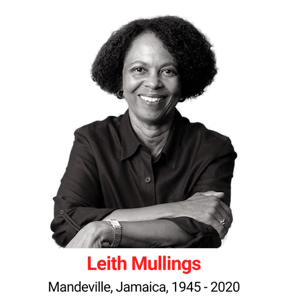

Leith Mullings was a Distinguished Professor of Anthropology at the City University of New York Graduate Center and President of the American Anthropological Association. She received her Ph.D. in Anthropology from the University of Chicago. Professor Mullings’ research and writing has focused on structures of inequality and resistance to them. Her research began in Africa, and she has written about traditional medicine and religion in postcolonial Ghana, as well as about women’s roles in Africa. In the U.S., her work has centered on urban communities. Through the lens of feminist and critical race theory, she has analyzed a variety of topics, including kinship, representation, gentrification, health disparities, and social movements.
Among her last articles, Interrogating Racisms: Toward an Antiracist Anthropology includes an extensive review of academic work on racism and offers a framework for thinking about changing structures of racism in a global context. Resistance and Resilience: The Sojourner Syndrome and the Social Context of Reproduction in Harlem presents a model to understand health disparities through consideration of class, race, and gender. Losing Ground: The War on Drugs and the Prison-Industrial Complex explores illegal drugs, incarceration, and gentrification in Central Harlem.
Excerpt from "Leith Mullings", in Anthropology Ph.D. Program, City University of New York. Online
Further reading:
BAKER, L.D. (2021), Leith P. Mullings (1945–2020). American Anthropologist, 123: 983-987. Online
BLAKEY, M.L. (2021), Remembering Leith. Transforming Anthropology, 29: 95-101. Online
Official website: http://leithmullings.com
Main publications:
2021. The Biology of Racism. American Anthropologist, 123(3), 671–680. Online
2019. Mapping Gender in African-American Political Strategies. Monthly Review, 71(4), 40–50. Online
2017. HALE, C., CALLA, P., & MULLINGS, L. Race Matters in Dangerous Times. NACLA Report on the Americas, 49(1), 81. Online
2015. MARABLE, & MULLINGS, L. How Capitalism Underdeveloped Black America. Haymarket Books. PDF
2015. Blurring boundaries: post-racialism, inequality and the anthropology of race. Journal of Contemporary African Studies, 33(3), 305–317. Online
2014. Movement, Migration, and Displacement: What Can Anthropologists Contribute to the Public Discourse? American Anthropologist, 116 (1):147-48. Online
2013. Presidential Address: Anthropology Matters, American Anthropologist, 117(1):4-16. Online
2009. New Social Movements in the African Diaspora: Challenging Global Apartheid. New York: Palgrave MacMillan. Online
2009. Let Nobody Turn Us Around: An Anthology of African American Social and Political Thought from Slavery to the Present, Second Edition, (co-editor with Manning Marable) Lanham, MD: Rowman and Littlefield. PDF
2006. Gender, Race, Class and Health: Intersectional Approaches (with Amy Schulz), San Francisco: Josser-Bass. PDF
2005. Resistance and Resilience: The Sojourner Syndrome and the Social Context of Reproduction in Central Harlem, Transforming Anthropology, 13(2): 79-91. Online
2005. Interrogating Racism: Toward an Antiracist Anthropology, Annual Review of Anthropology, 34: 667-93. PDF
2004. Globalization and Race: Racialization from Below, Souls: A Critical Journal of Black Politics, Culture and Society, 6(2): 1-9. Online
2002. MARABLE, & MULLINGS, L. Freedom: A History of African American Struggle. The Crisis, 109(6), 25–31.
2002. Losing Ground: Harlem, the ‘War on Drugs’ and the Prison-Industrial Complex, Souls: A Critical Journal of Black Politics, Culture and Society, 5(2): 22-41. Online
2002. Freedom: A Photographic History of the African American Struggle (with Manning Marable), London: Phaeton Press.
2001. Stress and Resilience: The Social Context of Reproduction in Central Harlem (with Alaka Wali), New York: Kluwer Academic/Plenum Publishers. Online
2000. African-American women making themselves: Notes on the role of black feminist research. Souls (Boulder, Colo.), 2(4), 18–29. Online
1997. On Our Own Terms: Race, Class and Gender in the Lives of African American Women. New York: Routledge. Online
1995. Households Headed by Women in the United States: The Politics of Class, Race and Gender, in Conceiving the New World Order, Faye Ginsburg and Rayna Rapp, eds., Berkeley: University of California Press.
1995. Racism remains pervasive. New Politics, 5(3), 31–34.
1994. MARABLE, & MULLINGS, L. The divided mind of Black America: race, ideology and politics in then post-Civil Rights era. Race & Class, 36(1), 61–72. Online
1993. Images, Ideology, and Women of Color. In Women of Color in U.S. Society (p. 265). Temple University Press. Online
1987. Cities of the United States: Studies in Urban Anthropology, editor, New York: Columbia University Press.
1984. Therapy, Ideology and Social Change: Mental Healing in Urban Ghana. Berkeley and Los Angeles: University of California Press.
1978. Critique: Racism, Group Identity and Mental Health. International Journal of Mental Health, 7(3-4), 165–171. Online
1978. Ethnicity and stratification in the urban United States. Annals of the New York Academy of Sciences, 318(1), 10–22. Online
